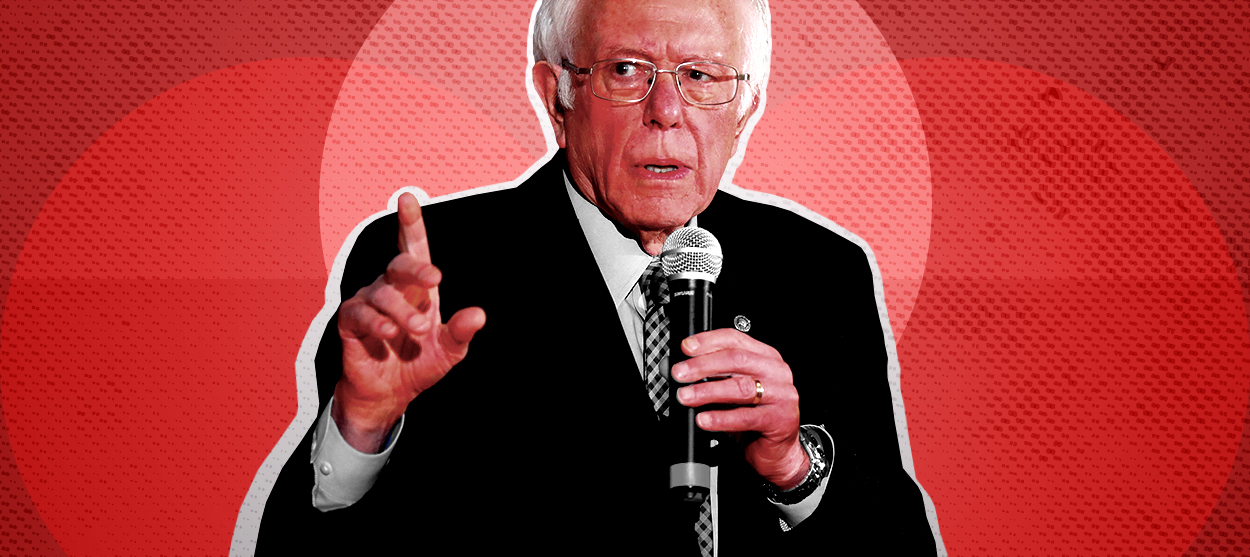Why Wall Street isn't freaking out about Bernie Sanders
Investors think President Sanders is unlikely and his agenda passing Congress unlikelier still


A free daily email with the biggest news stories of the day – and the best features from TheWeek.com
You are now subscribed
Your newsletter sign-up was successful
If you're a fervent Bernie Sanders supporter who thinks America is finally ready for a political and economic revolution, take a breath and consider: Why isn't Bernie's steady rise totally freaking out Wall Street? Does Big Money know something you don't?
Think about it: Voting starts in the New Hampshire primary today, and the self-described democratic socialist is arguably now in the best position to win the Democratic presidential nomination. Head-to-head polls consistently show him defeating President Trump. A Quinnipiac poll out yesterday has Sanders beating Trump by a comfortable eight points.
And yet the stock market keeps climbing. The S&P 500 is up nearly 15 percent over the past six months, gains that come after an already lengthy bull market run. Stocks barreled right though that Quinnipiac poll when it was released.
The Week
Escape your echo chamber. Get the facts behind the news, plus analysis from multiple perspectives.

Sign up for The Week's Free Newsletters
From our morning news briefing to a weekly Good News Newsletter, get the best of The Week delivered directly to your inbox.
From our morning news briefing to a weekly Good News Newsletter, get the best of The Week delivered directly to your inbox.
Pity those poor, oblivious bankers, right? Spare a single pang of sympathy for them. Don't they know the Bernie Bros are coming for their loot? The early days of the Sanders presidency may not be exactly like those scenes in The Dark Knight Rises when the populist mob drags wealthy Gothamites from their Upper East Side apartments. But once Bernie's big wealth taxes hit and he smashes the megabanks, life in Manhattan might feel pretty different to the private equity guys and hedgies.
Of course, that's not how Big Money sees things playing out. "A whopping 80-90 percent of participants at our client conferences thought that President Trump would win re-election in November," Goldman Sachs noted in a recent report. With the unemployment rate at a half-century low and economic confidence at a 20-year high, it seems inconceivable to many investors that voters wouldn't return Trump to office. For this crowd, prediction markets are as important, if not more so, than polling. And they show Trump as the favorite over the Democrats, with the exception of Mike Bloomberg. And nobody on Wall Street is going to panic if the next president is a guy who got rich selling data and software to Wall Street.
So folks keep on investing. Four more years of Trump means four more years of an overall business-friendly economic agenda of low taxes and light regulation. Even Trump's trade protectionism isn't super scary since he seems willing to retreat every time stocks flutter a bit. Both Trump and Wall Street share a critical common interest: They want the Dow industrials to keep on climbing.
Then again, most of these out-of-touch elitists probably thought Hillary Clinton would sweep to victory over Trump. Will they ever learn? Okay, fine. Let's assume America feels enough of the Bern to send the Vermont senator to the White House. Even then, Wall Street might not be too worried. "U.S. political institutions would still make dramatic policy changes unlikely if Sanders did become president," JPMorgan told its clients in a recent note. "We put the probability of major changes like Medicare-for-all or a wealth tax at less than 5 percent."
A free daily email with the biggest news stories of the day – and the best features from TheWeek.com
Not only does Sanders need to pull off a stunning victory, but he probably needs Democrats controlling both houses of Congress. And even that wouldn't be enough for Sanders' most radical ideas to become law. As JPMorgan adds, "For Medicare-for-all or a wealth tax to become reality, it would require Democrats to sweep the presidency and both houses of Congress, and it would require them to assemble either a large-enough majority to avoid the Senate filibuster or a committed-enough majority to triumph in a bare-knuckled procedural fight." All that heavy lifting, then, to pass a health-care proposal that's become more unpopular the more people hear about it. Good luck. In the end, people might like Bernie more than they like Bernie-nomics.
Or imagine if President Sanders were able to persuade congressional Democrats to go through with his $5 trillion in tax increases, including those on wealth and Wall Street. That would still leave Wall Street to cast its own de facto vote, just it did back in 2008 when Congress failed to approve the Bush administration's bank bailout plan. After the stock market tanked in response, Congress reversed course and passed the plan. A plummeting Dow might give Congress second thoughts about Bernie's war on wealth. In the end, Wall Street doubts the real-world application of Bernie's democratic socialism would look much different than the more pragmatic policies of Joe Biden or Amy Klobuchar.
A people-powered revolution? The smart money would tell Sanders supporters it's a bad bet.
Want more essential commentary and analysis like this delivered straight to your inbox? Sign up for The Week's "Today's best articles" newsletter here.
James Pethokoukis is the DeWitt Wallace Fellow at the American Enterprise Institute where he runs the AEIdeas blog. He has also written for The New York Times, National Review, Commentary, The Weekly Standard, and other places.
